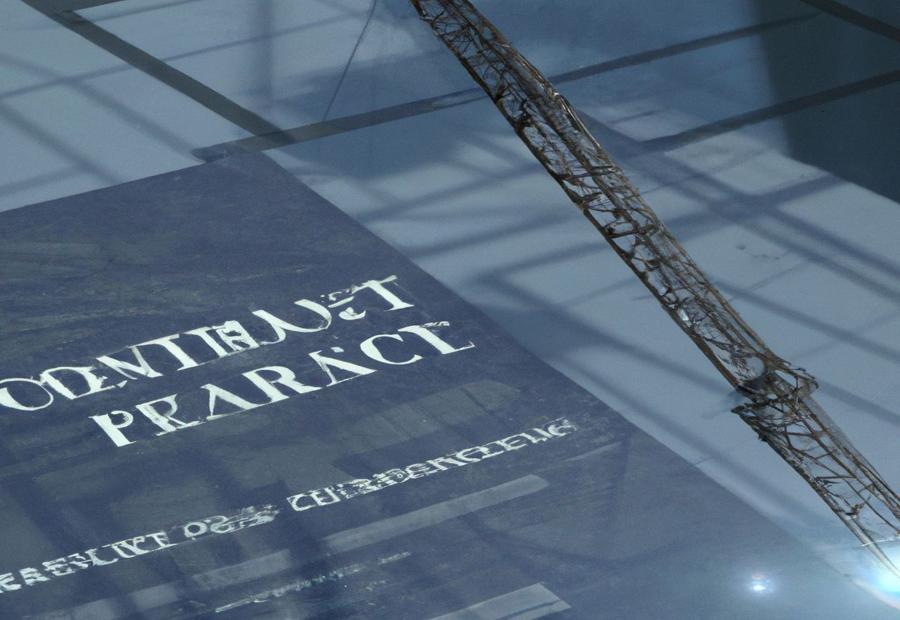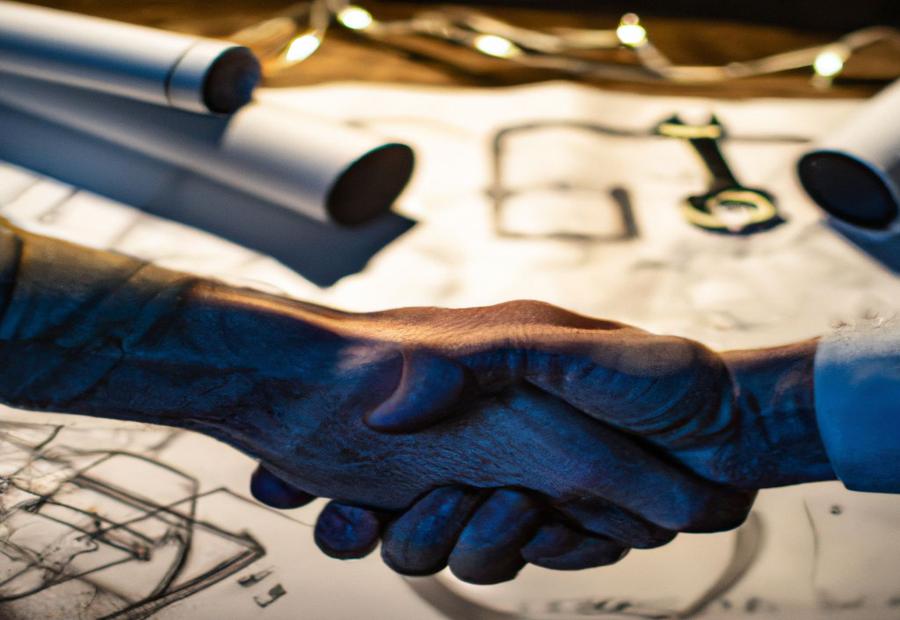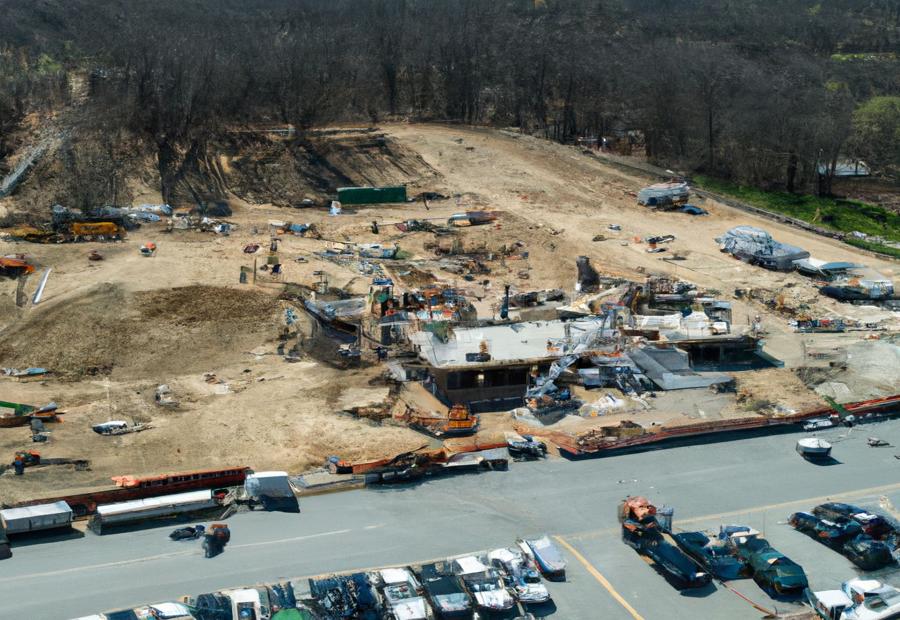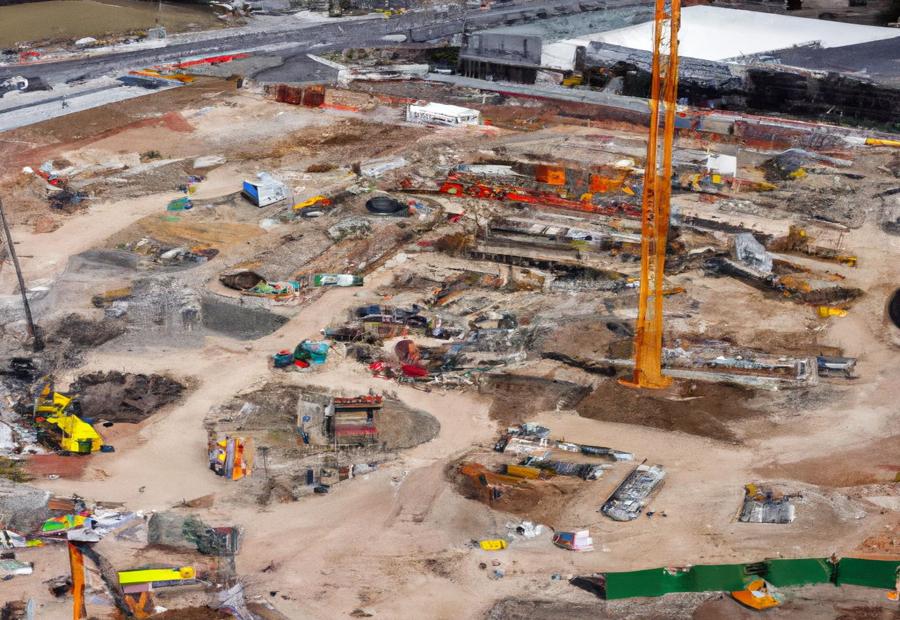

Contract negotiation in construction projects is a must. It involves discussing and reaching agreements on various terms between the owner, contractor, and subcontractors. A comprehensive guide provides valuable insights and knowledge on how to succeed in this complex process.
The guide outlines key aspects. These include:
Effective communication, transparency, and fairness are essential for protecting the parties’ rights and interests. Moreover, legal and regulatory requirements, as well as industry best practices, must be considered when drafting contracts. It also offers practical tips and strategies to negotiate favorable terms. These include:
This comprehensive guide serves as an invaluable resource for construction projects. It equips stakeholders with the knowledge and tools needed to navigate negotiations and secure favorable outcomes. Pro Tip: Consult legal professionals specializing in construction law to ensure the legality and enforceability of the negotiated contracts.

Photo Credits: Build-Wire.Com by James Garcia
Contract negotiation is a crucial aspect of construction projects, shaping the outcome and securing favorable terms. Understanding its definition, importance, and real-life examples will empower professionals in navigating these complex negotiations successfully.
Contract negotiation is an essential part of construction projects. It involves discussions between the parties involved to reach an agreement that pleases both sides. A successful negotiation ensures clarity and understanding, minimizing disputes and maximizing success.
Various factors must be taken into consideration during contract negotiation. These include:
Effective communication and emotional intelligence also play an important role.
Planning and decision-making skills are vital for successful negotiation. Careful planning allows for organized discussions. Research is also beneficial to understand industry standards and precedent contracts which can guide decision-making.
To ensure successful negotiation, all parties must understand their needs and objectives. Clear communication is key, and an oppositional stance must be avoided. It’s important to communicate non-negotiable terms and start with a contract draft.
Negotiation offers numerous benefits. It establishes strong business partnerships and promotes fairness. It builds trust between the parties, fostering a conducive environment for project success.
Pro Tip: To achieve successful contract negotiation in construction projects, all parties must remain open-minded and flexible. This facilitates a win-win outcome for everyone.
Contract negotiation is an essential part of building projects. It involves many opportunities for parties to talk about and agree upon contract terms. This makes sure that all sides are happy with the rules, and that their interests are protected.
Here are some common cases:
These examples show when contract negotiation is usually necessary. Good communication, careful listening, and clear statements of wishes and goals are necessary for all parties.
In addition, effective negotiation leads to better budgeting for both clients and contractors, strengthening their business relationship. With trust, understanding, and team effort, successful results can be achieved.

Photo Credits: Build-Wire.Com by Eugene Allen
Contract negotiation is a crucial step in any construction project. In this section, we will dive into the process of contract negotiation, exploring different components such as presenting a sample contract, discussing and negotiating the terms, making concessions, and ultimately finalizing the agreement. By understanding the ins and outs of this process, you’ll be better equipped to navigate the complexities of contract negotiation in construction projects.
Creating a table is helpful to effectively present a sample contract. It should have columns such as “Contract Term”, “Payment Schedule”, “Scope of Work”, “Change Order Procedures”, and “Dispute Resolution”. This helps create structure and makes it easy to understand and compare different elements.
It’s also important to communicate any unique details or specific requirements that may need further negotiation. This way, all aspects of the agreement can be addressed. This allows both parties to make informed decisions and reach a beneficial agreement.
Contract negotiations for construction projects require in-depth conversations to come to an agreement. It’s about understanding each side’s needs and expectations, and finding common ground. Active listening is key to communication and comprehension.
Both parties may make concessions to reach a compromise. This could involve tweaking clauses, adjusting timelines, or changing costs.
The deal is finalized when everyone agrees on the terms. A final version of the contract is then drafted to reflect the negotiated terms.
In the end, discussing and negotiating the terms is essential to ensuring that all aspects of the contract are clear. A little give and take can go a long way in securing agreement.
Concessions during contract negotiation for construction projects are essential. This involves both sides agreeing to compromise and change certain conditions. Doing this shows a commitment to finding common ground and solving any disputes.
When making concessions, various factors must be taken into account. Consider both parties’ needs and objectives, and the risks and benefits of different options. A balance must be struck between protecting one’s own interests and accommodating the other side.
Making concessions entails open communication. Both sides must actively listen to each other, and collaborate to find a solution.
Making concessions has benefits. It builds trust and cooperation, ensures both sides are content with the agreement, and fosters positive collaboration.
Finalizing the agreement in contract negotiation for construction projects is essential. To begin, a sample contract is presented, including all the discussed terms and conditions. Both parties then discuss any concerns or issues. Concessions may need to be made from either side to reach an even outcome. After all discussions, both parties come to a consensus on all the terms, any outstanding issues are resolved and final approval is given.
Following this guide can ensure successful project execution and establish a strong future collaboration between project participants. Master negotiation to reach success in construction projects!

Photo Credits: Build-Wire.Com by Walter Sanchez
Effective contract negotiation is crucial for success in construction projects. In this section, we will explore the essential skills required for a successful negotiation process. From strong communication skills to the power of emotional intelligence, we’ll delve into the key attributes that set apart skilled negotiators. Additionally, we’ll highlight the importance of planning and decision-making skills in ensuring favorable outcomes. So, let’s uncover the strategies and techniques that can elevate your contract negotiation game in the construction industry.
Clear, concise communication aids the swift exchange of info, making sure both parties understand the terms. Active listening allows negotiators to comprehend the other’s concerns and needs, creating a cooperative atmosphere.
Non-verbal communication, such as body language and tone of voice, can show genuineness and build trust in negotiation.
Effective written communication is also key for writing clear contract terms and noting down changes or concessions that are agreed upon.
Having strong communication skills aids contract negotiation. It helps express ideas, settle disputes, and achieve satisfactory outcomes for both sides. Emotional intelligence is essential too, as it helps one know when to take action and when to back off.
Emotional intelligence is essential to successful contract negotiation in construction projects. It enables individuals to understand and manage their own emotions, as well as recognize and respond to the emotions of others. Communication is a key part of this, as it helps to create understanding and trust between parties. Additionally, emotional intelligence allows negotiators to remain calm under pressure and find compromise solutions. Self-awareness and self-regulation are also important components of emotional intelligence, helping negotiators recognize their own biases and make informed decisions. Ultimately, emotional intelligence helps create a productive environment for resolving issues and reaching mutually beneficial agreements.
Planning skills are also critical for successful negotiation, as failing to plan is like building a skyscraper without a blueprint.
Planning is key when it comes to contract negotiation, especially in construction projects. It’s essential to guarantee success and efficiency. Strategic planning and organizing the negotiation process can make a huge difference in the outcome and both parties being satisfied.
Time management is an important part of planning. This helps negotiators allot enough time for each negotiation step. This includes reading contracts, having meetings, and making decisions. Time management makes sure negotiations stay on track and move quickly.
Analytical thinking is another vital part of planning for contract negotiation. Good planning skills allow negotiators to analyze and assess the terms and conditions of a contract. Examining all parts of the agreement can help negotiators spot potential risks or ambiguities that need addressing during negotiations.
Strategy is also important. Planning skills help negotiators create a strategy to reach their objectives. By setting priorities, goals, and other solutions, negotiators can deal with complex issues effectively and get the best result.
Risk assessment is an essential component of planning for negotiation. Good planning skills involve assessing risks that may arise during the negotiation process. By recognizing these risks, negotiators can make alternative plans or approaches to avoid any possible negative impacts.
In conclusion, with good planning skills, negotiators can make a structured plan for negotiation in construction projects. By managing time properly, analyzing contracts carefully, devising strategies, and assessing risks, negotiators can make the process smoother and reach an agreement that satisfies everyone.
Contract negotiation requires decision-making skills. All parties must analyze proposed terms, consider their interests, and make decisions that benefit both. This includes making concessions while assessing the value of the outcome.
A unique challenge in contract negotiation is navigating complex situations and prioritizing multiple stakeholders’ perspectives. Quick and accurate decisions must be made to serve interests and ensure project success.
To practice decision-making for contract negotiation, try scenarios with conflicting priorities and limited resources. This will help you weigh options and make sound decisions under pressure.
Mastering the art of successful contract negotiation in construction projects means getting what you want without making enemies or resorting to bribery.

Photo Credits: Build-Wire.Com by Walter Johnson
Effective contract negotiation is essential for successful construction projects. In this section, we will discuss the strategies that can lead to fruitful negotiations. From understanding your needs and objectives to practicing active listening and clear communication, these approaches will help you navigate the negotiation process with precision. By avoiding opposition and fostering a collaborative atmosphere, you can ensure a satisfactory outcome for both parties involved.
Knowing your needs and objectives is key to successful contract negotiation in construction projects. Articulating what your project needs and aims to achieve from the contract is essential. Identifying these needs and objectives clearly will help you communicate them effectively to the other party and gain a beneficial agreement.
Understanding your needs and objectives is important for both parties’ expectations aligning during negotiations. You can prioritize certain terms or conditions which are essential for your project’s success. Knowing what you need and want to achieve allows you to focus on negotiating these while being open to compromises.
In addition to prioritizing needs, you should consider the long-term objectives of your construction project. These include timelines, budget, quality standards and desired results. Having a clear vision of these objectives helps you negotiate terms that will benefit the project overall.
Knowing your needs and objectives in contract negotiation allows for a collaborative approach with the other party. This encourages communication, listening and problem-solving. It allows all parties involved to find common ground that meets their goals.
Overall, understanding your needs and objectives is key for successful contract negotiation in construction projects. It gives clarity, sets priorities and guides decision-making during the process. Knowing both short-term needs and long-term objectives ensures all parties are on the same page, leading to a beneficial agreement.
Questions are a must in contract negotiations for construction projects. They allow both sides to get to know each other better, leading to strong communication and a successful agreement. Questions can make the process clearer by highlighting uncertainty, addressing potential problems, and discussing all aspects of the contract.
Questions make the negotiation more detailed. Everyone can get more info, discuss ideas, and explore options before agreeing. Relevant questions help to go into details and make sure that all needs are covered. This prevents future misunderstandings and disputes by making expectations and duties clear.
Moreover, questions in contract negotiation show that people are actively involved and eager to find a good solution. They show that one is ready to listen and understand the other side, creating an atmosphere of open dialogue and collaboration. Asking questions can build trust and rapport, making strong business ties possible.
Active listening is essential during contract negotiation in construction. It’s not just about hearing what’s said, but also observing non-verbal cues and nuances. This enables negotiators to pick up on important details, uncover potential conflicts, and strive for a beneficial agreement.
When it comes to contract negotiation, active listening is key. It helps negotiators understand the needs and objectives of each party. It also means acknowledging and validating the other party’s concerns, as well as asking questions for clarification.
Non-verbal cues, such as body language and tone of voice, can give negotiators an understanding of the other party’s emotions and intentions. With this knowledge, they can make informed decisions and respond accordingly.
Active listening leads to improved understanding, better problem-solving, and enhanced collaboration. It creates an environment of respect and inclusion, increasing the chances of reaching an agreement that meets both sides’ needs.
Incorporating active listening in contract negotiation practices helps build positive relationships based on trust and open communication. This sets the stage for successful projects and reduces the risk of conflicts that could slow down progress. Therefore, active listening is vital for efficient contract negotiation in construction projects.
Communicating clearly is key in construction project contract negotiation. Each party may possess different levels of knowledge or expertise, so adjust the communication style for better understanding. Negotiations involve multiple conversations and revisions – clear communication keeps all parties updated on any changes to the terms. For instance, there was ambiguity about the delivery timeline for materials in a construction project, leading to delays and extra costs. If the timeline and expectations had been communicated clearly, the misunderstanding could have been avoided.
Negotiating contracts in construction projects needs a collaborative approach. To avoid opposition, it is important to keep a positive and cooperative relationship. Focus on mutual understanding and finding common ground to reach an agreement. This encourages open communication and lowers the chance of disputes.
It’s vital to prevent an oppositional stance which may slow down progress. Listen to the other party’s perspectives and clearly communicate your own needs. This builds trust and cooperation. Both sides can work together to find suitable solutions.
Employ good communication skills like active listening and clear articulation. Ask questions that foster dialogue and address all parties’ interests. Avoid confrontational language or approaches to maintain a positive atmosphere. This supports constructive problem-solving.

Photo Credits: Build-Wire.Com by Walter Jones
Tips for successful contract negotiation in construction projects highlight the importance of doing thorough research, starting with a well-drafted contract, breaking negotiations into manageable parts, and effectively communicating non-negotiable terms. By following these guidelines, you can navigate the complexities of contract negotiation and increase the likelihood of achieving favorable outcomes for all parties involved.
Research is key in the contract negotiation process for construction projects. Gathering information to support your strategy and getting to know the project, those involved, and industry standards is crucial. Research helps you understand the project specifications, market trends, legal regulations, and risks. You can assess options, anticipate issues, and find opportunities for mutual benefit.
Researching gives you confidence and credibility. Look into the project scope, specs, and budget to create your negotiation strategy. Additionally, learn about the other party’s background, finances, and past contracts.
Understand negotiation tactics and styles for the most effective strategies. Learn best practices and case studies in the construction industry. Build a plan that deals with potential obstacles and makes you powerful in bargaining.
Use technology for research. Utilize software and platforms for data analysis and market research. Access industry databases and seek advice from construction contract specialists. Stay updated on industry trends and legal regulations to adjust your strategies.
Contract negotiation in construction projects starts with the preparation of a contract draft. This initial document serves as the beginning for negotiations and outlines the terms and conditions that will be discussed and potentially altered. A contract draft gives a distinct base for the negotiation process, enabling all parties involved to have a common comprehension of the initial terms.
Here is a 4-step guide to commencing with a contract draft:
Beginning with a contract draft permits all parties involved in construction projects to initiate discussions from a clear beginning point. It gives a foundation for negotiations by specifying the initial terms and conditions while allowing flexibility for changes as required throughout the process.
Divide the negotiation process into smaller, manageable sections for a more focused approach to reaching an agreement. Break it down into six steps:
By breaking the negotiation into parts, efficient communication and better understanding of each party’s needs and objectives can be achieved, leading to a successful negotiation.
Contract negotiation in construction projects demands clear communication of non-negotiable terms. Both parties must understand and agree on these terms, with no room for confusion. This makes negotiations run smoothly and guarantees a successful outcome.
When discussing these terms, it is essential to use precise language. This outlines boundaries and sets expectations for all involved. This also reduces the chances of disagreements or disputes.
To communicate non-negotiable terms effectively, objective language is key. This can be accomplished through specific terminology and concrete examples. Explanations and clarifications help everyone comprehend the implications of the terms, and make informed decisions during the process.

Photo Credits: Build-Wire.Com by Jerry Walker
Contract negotiation in construction projects comes with a multitude of benefits. From establishing strong business partnerships to ensuring both parties get what they want and fostering a positive and collaborative approach, the advantages are undeniable. By delving into this section, we’ll uncover the value of contract negotiation and how it plays a pivotal role in the success of construction projects. With concrete facts and figures, backed by reputable sources, we’ll explore why this aspect is crucial in achieving desired outcomes.
Contract negotiation in construction projects is all about forming strong business partnerships. It’s about creating mutually beneficial relationships between companies involved in the project. These partnerships are essential for success. This is why effective negotiation is key.
It’s a chance to communicate needs and objectives, work out areas of collaboration and reach common ground. Open and honest communication builds trust and strengthens relationships.
Exploring synergies and shared goals is also important. By understanding each other’s priorities and working together, construction firms and partners can achieve their objectives. This collaborative approach helps now and in future projects.
Negotiation is like a game of give and take. But the goal is to make sure both sides leave happy.
Contract negotiation for construction projects helps both parties get what they want. Here’s a guide:
Plus, contract negotiation fosters positive business relationships and project success. It allows long-term growth in construction.
Fostering a positive and collaborative atmosphere is key in contract negotiation for construction projects. Building strong relationships and open communication between stakeholders can lead to successful outcomes.
Promoting positivity allows every party to feel comfortable sharing their needs and worries. This can be done through active listening and clear expression of ideas.
Collaboration encourages information and ideas to be shared. Not only does this allow both parties to find common ground, but it also allows for creative solutions that meet everyone’s interests.
Additionally, a positive and collaborative approach helps build trust between the parties involved. When trust is present, it’s easier to tackle any conflicts during the negotiation process. This creates an environment of cooperation and respect, increasing the chance of a successful outcome.
In conclusion, fostering a positive and collaborative approach during contract negotiation in construction projects is beneficial. Stakeholders can create strong working relationships, promote effective communication, encourage creativity, and build trust. These factors contribute to reaching agreements that benefit everyone.

Photo Credits: Build-Wire.Com by Jeremy Torres
Negotiating construction contracts demands close attention to detail and a profound understanding of the project’s unique needs. Examining the comprehensive guide to contract negotiation in construction projects reveals that successful negotiations need a thorough review of all terms and conditions, including payment terms, performance expectations, and dispute resolution mechanisms. This allows both parties to set clear objectives and reduce the risk of issues or delays in project execution.
The guide covers a range of essential aspects of contract negotiation in construction projects. For example, the importance of defining project scope clearly, having a realistic timeline, and assigning risks and responsibilities. It also highlights the importance of good communication between the contracting parties, such as progress reports, change order protocols, and documenting all project-related discussions.
One distinct detail in the guide is the significance of making sure payment terms are clear. This includes a reasonable and transparent payment schedule, when payments are due, and the conditions for payment. It is vital to analyze and negotiate these terms to protect both sides and maintain a good working relationship throughout the project.
In short, successful contract negotiation in construction projects requires an understanding of the project’s unique needs and a careful examination of all terms and conditions. Following the guide to contract negotiation in construction projects helps to set clear expectations, reduce risks, and promote successful communication and collaboration.
Contract negotiation is the process of discussing and reaching an agreement on the terms of a contract that benefits both parties. It is crucial in the construction industry to ensure that everyone’s needs are met and to establish a conflict-free business relationship. Poorly negotiated contracts can negatively impact project quality and the working relationship between stakeholders.
Examples of situations that involve contract negotiation in construction projects include negotiating a real estate contract, pricing with a scaling customer, terms of a supply agreement with a vendor, and terms of an acquisition. These negotiations help outline the contract’s structure, performance requirements, obligations, and financial aspects.
The contract negotiation process for construction projects typically involves presenting a sample contract, discussing and negotiating the terms, making concessions, and finalizing the agreement. It is important to practice active listening, ask questions, and communicate clearly throughout the negotiation process. This helps ensure a smooth negotiation and a well-negotiated contract.
Strategies for successful contract negotiation in construction projects include knowing your needs and objectives, asking questions, practicing active listening, communicating clearly, and avoiding being oppositional. It is also important to do research, start with a contract draft, break the negotiation into parts, and clearly communicate non-negotiable terms.
Contract negotiation helps build long-term relationships between clients and contractors in the construction industry. By ensuring that both parties get what they want and fostering a positive and collaborative approach, contract negotiation promotes trust and a mutually beneficial business partnership. This leads to continued business referrals and a strong network of relationships.
Attributes that help in successful contract negotiation include listening, bargaining, collaboration, preparation, memory, candid discussions, persuasion, stress management, intuition, flexibility, and gaining trust. These attributes enable effective decision-making, finding compromises, and achieving satisfactory outcomes for all parties involved.